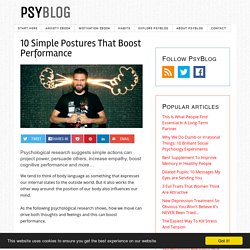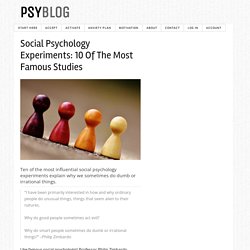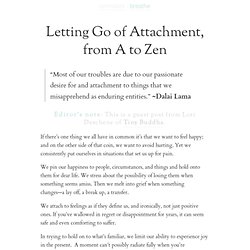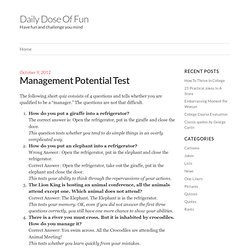

Life Hacks. Advice from /b/ Why Intelligent People Fail. 30 Things to Stop Doing to Yourself. 10 Simple Postures That Boost Performance. Psychological research suggests simple actions can project power, persuade others, increase empathy, boost cognitive performance and more… We tend to think of body language as something that expresses our internal states to the outside world.

But it also works the other way around: the position of our body also influences our mind. As the following psychological research shows, how we move can drive both thoughts and feelings and this can boost performance. 1. Pose for power If you want to feel more powerful then adopt a powerful posture. 2. Tensing up your muscles can help increase your willpower. 3. If you’re stuck on a problem which needs persistence then try crossing your arms. Fear sucks.
Bruce Lee quotes. 10 Brilliant Social Psychology Studies. Ten of the most influential social psychology experiments.

“I have been primarily interested in how and why ordinary people do unusual things, things that seem alien to their natures.Why do good people sometimes act evil? Why do smart people sometimes do dumb or irrational things?” –Philip Zimbardo Like eminent social psychologist Professor Philip Zimbardo (author of The Lucifer Effect: Understanding How Good People Turn Evil), I’m also obsessed with why we do dumb or irrational things. The answer quite often is because of other people – something social psychologists have comprehensively shown. Over the past few months I’ve been describing 10 of the most influential social psychology experiments.
Each one tells a unique, insightful story relevant to all our lives, every day. Infographic: Write It Down. Your Brain in Love: Scientific American. Men and women can now thank a dozen brain regions for their romantic fervor.

Researchers have revealed the fonts of desire by comparing functional MRI studies of people who indicated they were experiencing passionate love, maternal love or unconditional love. Together, the regions release neurotransmitters and other chemicals in the brain and blood that prompt greater euphoric sensations such as attraction and pleasure. Conversely, psychiatrists might someday help individuals who become dangerously depressed after a heartbreak by adjusting those chemicals.
Passion also heightens several cognitive functions, as the brain regions and chemicals surge. “It’s all about how that network interacts,” says Stephanie Ortigue, an assistant professor of psychology at Syracuse University, who led the study. Graphics by James W. Letting Go of Attachment, from A to Zen. “Most of our troubles are due to our passionate desire for and attachment to things that we misapprehend as enduring entities.”

~Dalai Lama Editor’s note: This is a guest post from Lori Deschene of Tiny Buddha. If there’s one thing we all have in common it’s that we want to feel happy; and on the other side of that coin, we want to avoid hurting. Yet we consistently put ourselves in situations that set us up for pain. We pin our happiness to people, circumstances, and things and hold onto them for dear life. We attach to feelings as if they define us, and ironically, not just positive ones. In trying to hold on to what’s familiar, we limit our ability to experience joy in the present. Short but tricky management ability test - StumbleUpon.
The following short quiz consists of 4 questions and tells whether you are qualified to be a “manager.”

The questions are not that difficult. How do you put a giraffe into a refrigerator? The correct answer is: Open the refrigerator, put in the giraffe and close the door.This question tests whether you tend to do simple things in an overly complicated way.How do you put an elephant into a refrigerator? Wrong Answer : Open the refrigerator, put in the elephant and close the refrigerator. Correct Answer : Open the refrigerator, take out the giraffe, put in the elephant and close the door.This tests your ability to think through the repercussions of your actions.The Lion King is hosting an animal conference, all the animals attend except one.
According to Andersen Consulting World wide, around 90% of the professionals they tested got all questions wrong. 29 life lessons learned in travelling the world for 8 years straight. Human needs. Flow (psychology) Concentrating on a task is one aspect of flow.

In positive psychology, flow, also known colloquially as being in the zone, is the mental state of operation in which a person performing an activity is fully immersed in a feeling of energized focus, full involvement, and enjoyment in the process of the activity. In essence, flow is characterized by complete absorption in what one does, and a resulting loss in one's sense of space and time. Flow shares many characteristics with hyperfocus. However, hyperfocus is not always described in a positive light. Some examples include spending "too much" time playing video games or getting side-tracked and pleasurably absorbed by one aspect of an assignment or task to the detriment of the overall assignment. Just as with the conditions listed above, these conditions can be independent of one another.
Ideas similar to flow have been recognized throughout history and across cultures. Schaffer (2013) proposed 7 flow conditions: Further, he writes: Notes. 50 Questions That Will Free Your Mind - StumbleUpon.